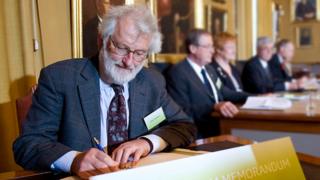Genome pioneer John Sulston enters elite club
 Image copyright
Getty Images
Image copyright
Getty Images
British genome pioneer Sir John Sulston has been elevated to the Companion of Honour in the Queen’s birthday list.
Only 65 people, including the sovereign herself, can hold the distinction at any one time.
Sir John won a Nobel Prize in 2002 for his breakthrough contribution to the understanding of how genes control cell division and cell death in an organism.
One of the researchers with whom he shared that prize, Sydney Brenner, joined the elite group back in 1986.
To become a Companion of Honour, an individual has to have made a major contribution to the arts, science, medicine, or government over a long period of time.
Existing members include David Hockney and Sir David Attenborough. Those joining with Sir John include JK Rowling and Sir Paul McCartney.
Another newcomer is Lord Stern, one of the world’s foremost experts on the economics of climate change.
Sir John’s own defining research was conducted on small worms but he came to international prominence as the British face of the project to decode the human genome - our own biochemical "instructional manual".
He also helped found the Wellcome Trust Sanger Institute at Hinxton near Cambridge. The Institute now runs the largest genomics programme in Europe, and the laboratories there bear his name.
Sir John leads a group of scientists recognised in the Queen’s Birthday Honours.
There is a knighthood for Hugh Godfray, the Hope Professor of Zoology at Oxford University; and damehoods for precision measurement scientist Prof Jiang Xiangqian from Huddersfield University, and BP’s chief scientist, Dr Angela Strank.
And Prof Carlos Frenk, director of Durham University's Institute for Computational Cosmology, was made a CBE for services to cosmology and the public dissemination of basic science.
